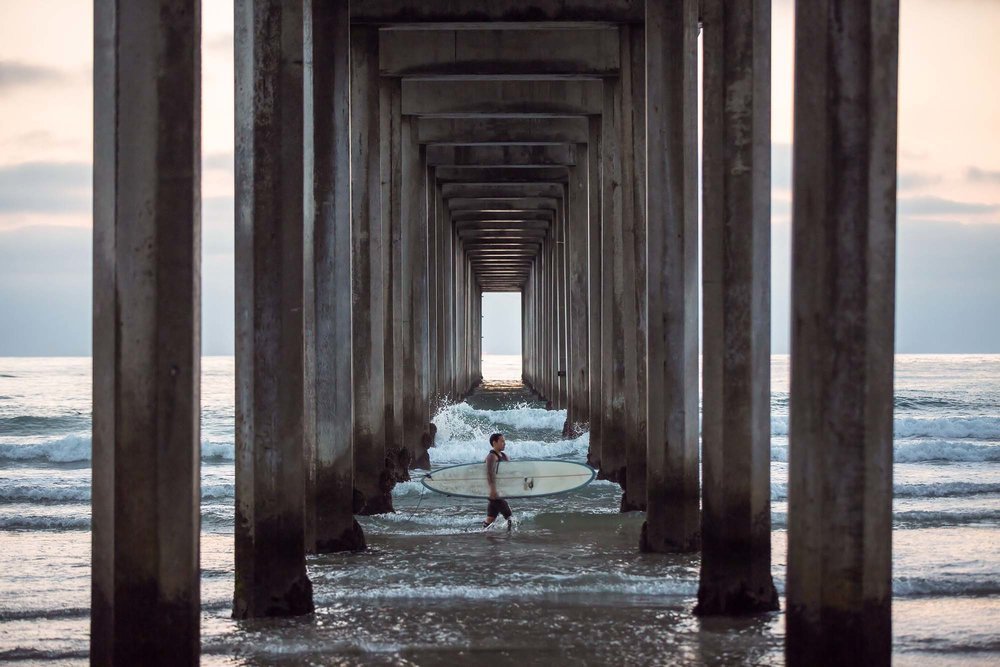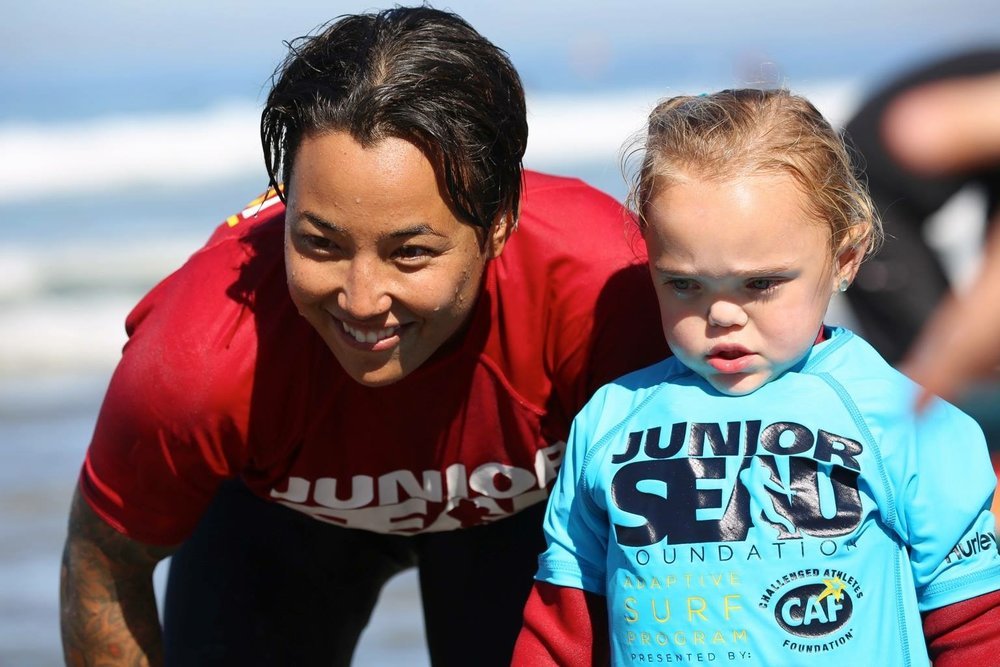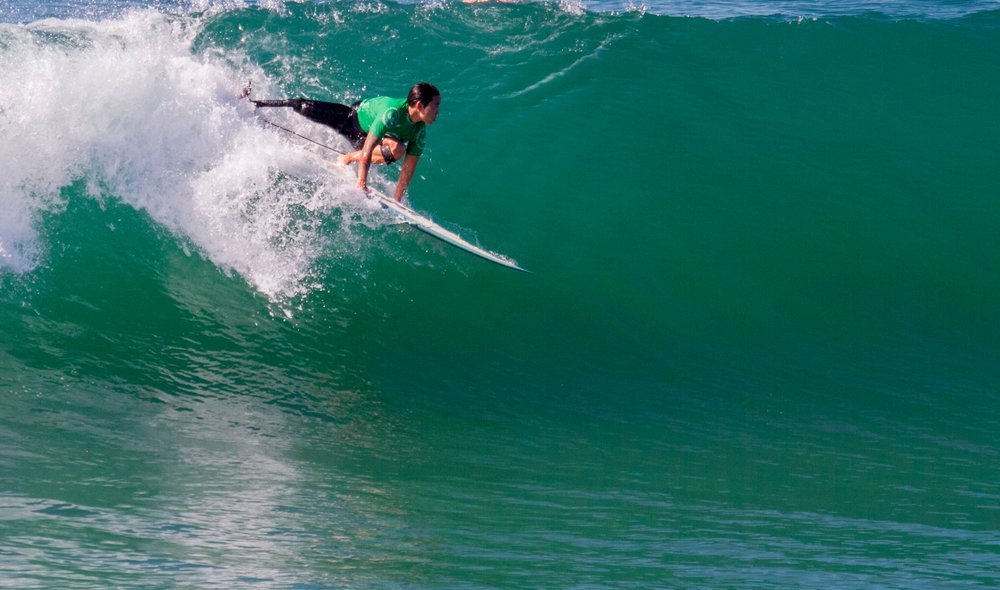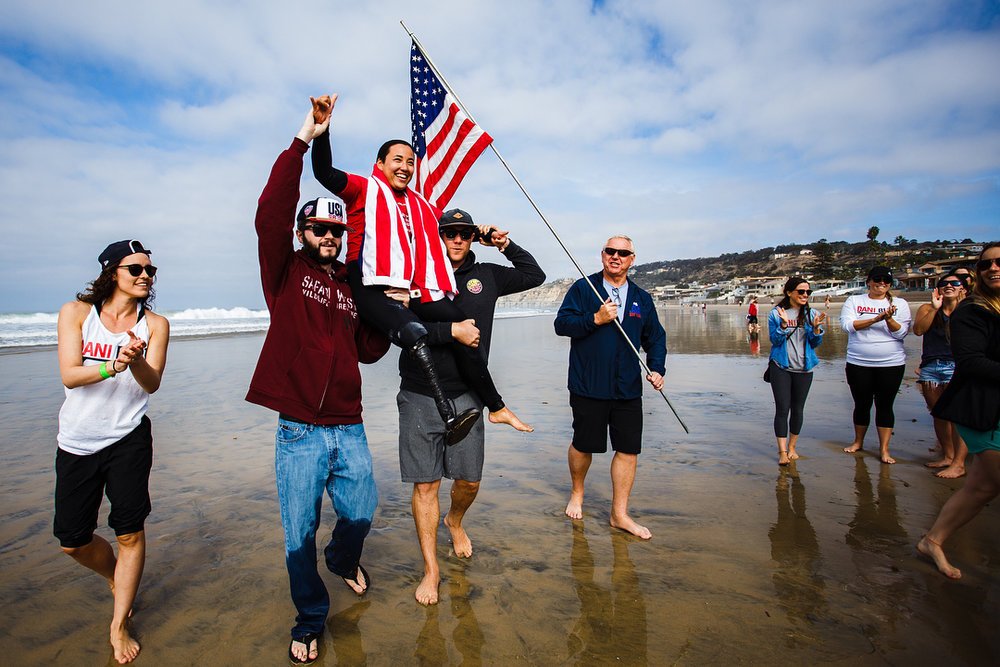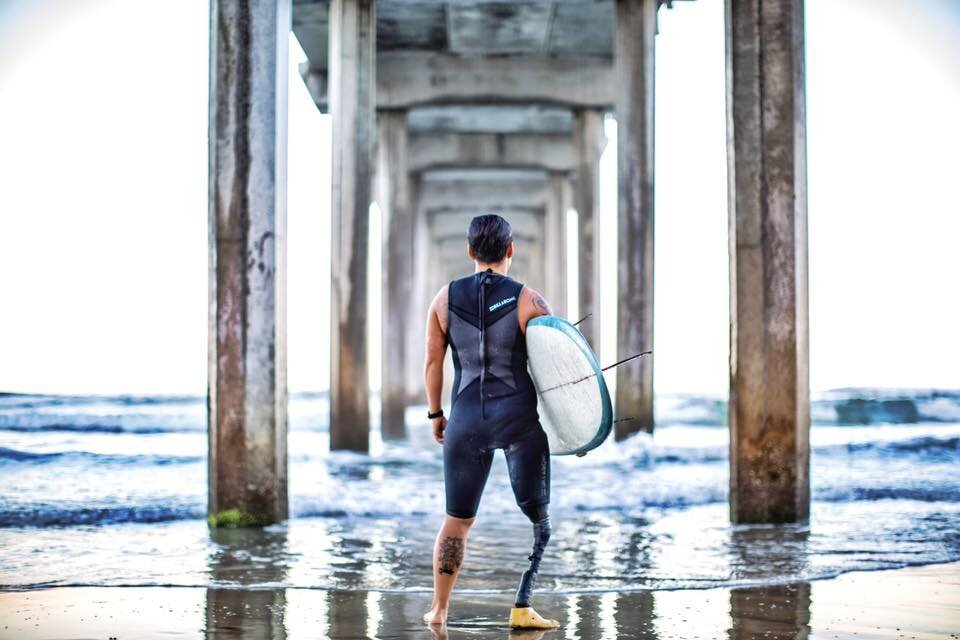Adaptive World Champion Surfer, Dani Burt
By Danielle Black Lyons
The first thing you notice about Dani is her big smile. She is a bright light in a sea of expressionless faces, most of which are still waking up as they paddle out to the lineup in Cardiff. It’s 6:30am and Dani is clearly stoked to be here and it’s infectious. We sit in the lineup and wait for the set to roll through. We talk about life and our backgrounds in between sharing waves. Some conversations end mid sentence because waves come first, conversation is secondary. If you surf, you know this unspoken rule. We chit chat, we surf and laugh. She charges fearlessly on a late take off and makes the drop. I like her instantly.
She tells me about her prosthesis, its giving her some trouble because it doesn’t fit just right. She has to use a different technician than she’s used to because insurance won’t cover the cost from her usual technician. We surf a few hours and make plans to meet again in Oceanside. I caught up with Dani, post surf to dig a little deeper into her story.
So Dani, surfing came about after your accident, what inspired you to get into it? Do you have any mentors or surf heroes who inspire you?
I grew up body boarding in Jersey. The ocean has always been a place that I considered my home. After my crash and rehabilitation, I got back into skateboarding and started competing in snowboarding. But what I desperately needed was to be in the ocean again. At that time I was told constantly that I was not allowed to take my prosthesis in the water. It was so hard just to get a leg I could wear for everyday life, it seemed unfathomable to get a water leg if something like that even existed 15 years ago. I tried bodyboarding again without a leg but it was too strenuous on my left ankle.
Image Qwest Photography
I had some friends who surfed so seeing them out there made me really want to give it a go. I kept my old prosthetic parts and once I had enough to assemble a leg that I could try to surf in, my friend Michael and I got to work. It took quite a bit of trial and error to finalize but once it was done, I was hooked.
I’ve been blessed to have had friendships with some of the most incredible surfers in the world and have their support and love through my journey of learning to surf. Donald Takayama hooked me up with my first board, Betty Michalewicz was the first person to ever take me out on a surfboard before I even had a leg to stand on. I could drop so many names for the people who have inspired me. I’m beyond grateful to have friends that completely believed that I could accomplish something that wasn’t thought of as being possible and be all in on finding a way to make it happen.
It is so important to have mentors in our lives. You are a mentor for the Challenged Athletes Foundation, can you tell us more about this?
I first met CAF when I was a patient at Sharp Memorial Rehab. They were there to show me that I can still be athletic even though my leg was gone. At the time, the focus was on triathlons and the paralympics. 15 years ago, adaptive action sports wasn’t a thing. I started training for triathlons after rehab and quickly realized that was not my jam. So instead, I asked for sport grants to assist me in getting back to skating, learning/competing in snowboarding and surfing. They had never given grants out for those sports before for an above knee amputee but they believed in my dreams from the get go. They have supported me from the beginning with grants for prosthetic sport components, training and competition. Health insurance does not pay for sport legs. That’s considered unnecessary which is really disturbing. Without the support and love of CAF, I wouldn’t be where I am today, mentally or physically.
I will never forget what CAF has done for me and continues to do for so many. I am a firm believer in paying it forward. I mentor/coach for CAF’s surf clinics as much as I can to show the next generation what is possible and try to make the road I had to travel on a little less bumpy.
CAF Photography
Pat Weber Photography
Amazing! You are definitely paying it forward in a big way. I know so many people admire what you are doing, myself included.
You are an adaptive world champion surfer, do you enjoy competing still? What competitions do you have coming up? What was your most proud moment competing?
I love hanging out with my friends that come from all over the world to compete at these events. Competing also significantly improved my surfing in a relatively short period of time. But I also don’t typically enjoy surfing bad conditions at the most blown out times of the day.
My first competition was in 2010 and really picked it up full time after I graduated from grad school in 2015. This year I’ve taken a step back from competing. I feel it’s time to refocus on just surfing for the pure love of it instead of achieving results to get on the podium.
With that said I haven’t completely retired, I had my first competition that I entered into this year, the US Open Adaptive Surfing Championship, September 26-29th at Oceanside Pier. I placed second in all gender stand division. Adaptive surfing competitions are still the best/most fun events ever, in my opinion.
I would have to say my most proud moment having to do with competing was after convincing the ISA to re-evaluate their point system for the World Championships and to stand on the side of gender equality. That was a really hard time for me but so rewarding to know that there are people out there that have my back and will fight by my side. It was a beautiful day when the headlines came out that WSL and ISA will have equal prize purses and points.
Gender equality is a hot button issue that is deserving of our attention. What does the Dani Burt brand represent and why is it important? Your tagline is, "To advocate for equality in surfing," are we closer to reaching that goal? How do we create a more inclusive surf culture?
Surfing has saved my life in so many ways. I’m in a privileged position with my brand that gives me a platform where I can have my voice heard. I believe that achieving equity in surfing will cause a ripple (hopefully Tsunami) effect for all sports and other sectors of life. It’s important because the world is completely diverse. By only representing one small group we miss out on so much that would benefit everyone. We have this one life to live and we all deserve to live it fully. I definitely believe we are closer to reaching that goal. There’s ups and downs like anything else in life but the trajectory is moving in a positive direction with so many incredible people leading the charge.
We create a more inclusive culture by visibility, knowledge and opportunity. All it takes is one picture, one story, one chance to alter a perception that has been held for way too long.
Chris Grant Photography
Absolutely! We appreciate you using your platform to empower and uplift so many groups. That is not always the case when people are in a position of power.
You are a doctor of physical therapy, a WOC, amputee and part of the LGBTQ community, how has it been navigating the mainly white, heterosexual, male surf industry? What role does the media play in perpetuating this image?
Hard! I enjoy a challenge but c’mon life, throw me a bone here! Haha. But seriously, even with all those parts of my identity that have negatively impacted times in my life, I still stand in a privileged position: I have access to healthcare, higher education, solid friends in and out of the surf industry that have my back. When I’m navigating all the other crap out there that can really weigh me down I try to remember that privilege and move forward with grace.
The media perpetuates this image by what they choose to display. It’s easy to go with what you may think has been working. It’s scary for change, it takes work and conversations that need to be had. But when all is said and done, the whole industry will look back at history and say what the heck were we thinking?
Yes, tides are changing! Surfing is still a heavily white male dominated sport.
Are you typically the only WOC/adaptive surfer in the water? How does that feel? Have you faced any blatant discrimination in your surf journey?
The times I am the only WOC/adaptive surfer in the water exponentially out numbers the times that I haven’t been. Living the life I’ve had has taught me how to disconnect from certain situations and focus on what I decide is important in that moment which can be a blessing and a curse at times. I have for sure faced blatant discrimination in my surfing journey. Fortunately my love for surfing and the amazing experiences I’ve had far outweighs all of the negative. It can definitely be said that this is why I have a brand and stand for what I stand for. It makes me feel that there is work to be done. It makes me sad and even angry at times but also hopeful and stoked when I see the progress that has been made.
There has definitely been progress and that gives us hope. Have you seen a rising demand from WOC, and women with different abilities to get into the ocean and surf?
Yes but I feel the demand has always been there. The difference now is that there are people, organizations, media that are willing to hear them and let them be seen. WOC, women with different abilities, they’ve always been there charging we’re just paying attention now. The doors are all being unlocked.
You nailed it. We have always been there, they just now are seeing us.
Outside of surfing, what lights you up?
My friends. They are what make this life so beautiful, unforgettable and worth fighting for.
Mike Bresnen Photography
